Back to normal life — sort of.
With COVID-19 vaccines widely available, California colleges welcomed students back for a mix of in-person and online classes this fall. After months of studying virtually from childhood bedrooms and other remote locations, students could once again ask questions of professors face-to-face and socialize with their peers IRL.
The transition didn’t always go smoothly.
Some students struggled to find affordable housing. Others discovered they actually preferred online classes — especially when trying to juggle work with school. And policies around vaccines and other coronavirus safety measures were sometimes confusing and unevenly enforced. Still, many said the chance to connect with other students in person was worth the strife, whether that meant putting on a theater performance together or simply studying side by side.
Reporters with the CalMatters College Journalism Network spoke with students from around the state about their experience returning to campus this fall — the highs, the lows, and the just plain weird. (Comments have been edited for length and clarity.)
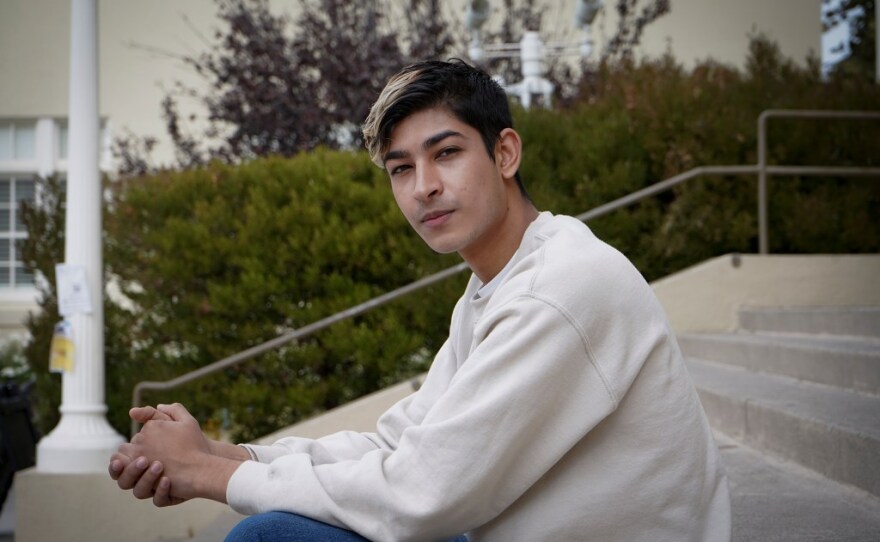
Jeevan Acharya, Chapman University
Senior film production and computer science major
We shot my thesis Oct. 17 weekend and the weekend after. My thesis is about a newlywed, reserved, Indian-American woman who risked being excommunicated from her and her husband’s family after they see her in a provocative commercial while on vacation in Mexico.
The biggest part about (the production) was adapting as the situation was changing. And every week, we had to update our (COVID-19) guidelines to make sure everybody was safe. If you have holes in there, your production could get shut down. So any minor things are taken pretty seriously.
My freshman and sophomore year — before COVID happened — I had a lot of experience on set. But a lot of those positions weren’t in key roles —they were kind of learning and being an understudy of those key positions. And your Advanced Production comes at a crucial time where you step from those smaller positions into those larger roles, and you carry a lot more responsibility on your shoulders.
The way I prepared for it was a lot of counsel with my advisors, and just kind of trusting the process, having faith in myself that I would deliver in the end. I feel like that’s a really hard thing for creative people, and especially art students to do: to trust what they’re doing, really believe in themselves 100%, and have faith that it’s going to turn out the way you want it if you put the work in.
Having time to really mold the film into what I want is just such a huge stress reliever. Over the summer it was almost like this looming shadow over my head. And now that it’s done, it’s like, I see brighter days.
— Interviewed by Juhi Doshi
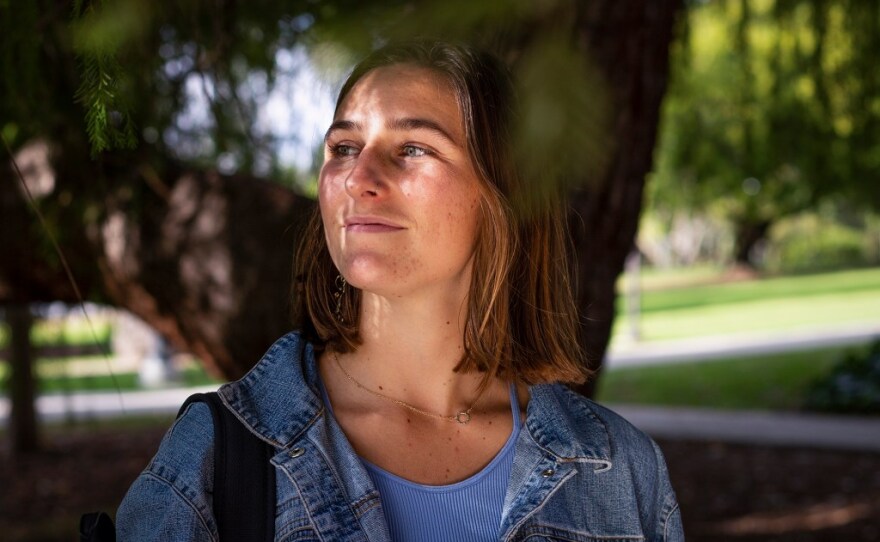
Cate Armstrong, Cal Poly San Luis Obispo
Senior sociology major and lead singer in the band Purple Hibiscus
We started (the band) in the end of June. The first show that we had was at my house. We planned it, but I was like, I’m nervous about this because we’re entering a new realm of, “Is it acceptable to do this? How many people can be there? Is this outside? Masks or no masks?” What we want is for everybody to be safe and happy and healthy. The COVID anxiety hasn’t necessarily gone away, (but) I think the route that we have been able to follow has been safe.
My favorite moments are when I get to kind of step back and witness my bandmates in their flow moments. I’ll look to the side and I see Tim just absolutely ripping a riff, and you can tell he’s just so connected with what he’s doing. Getting to watch those organic moments of just absolute bliss is really special.
(We’re) just embracing the need for this music. We’ve been isolated for over a year and a half, and it’s just like this craving is being met of being around other people and experiencing music together. Just the genuine smiles of people in the crowd, watching people get down and dance — it’s just a different way of expression that we haven’t been able to access in the last year and a half. Watching people connect with a different part of themselves that has kind of been locked away for a sec is really beautiful.
— Interviewed by Stephanie Zappelli
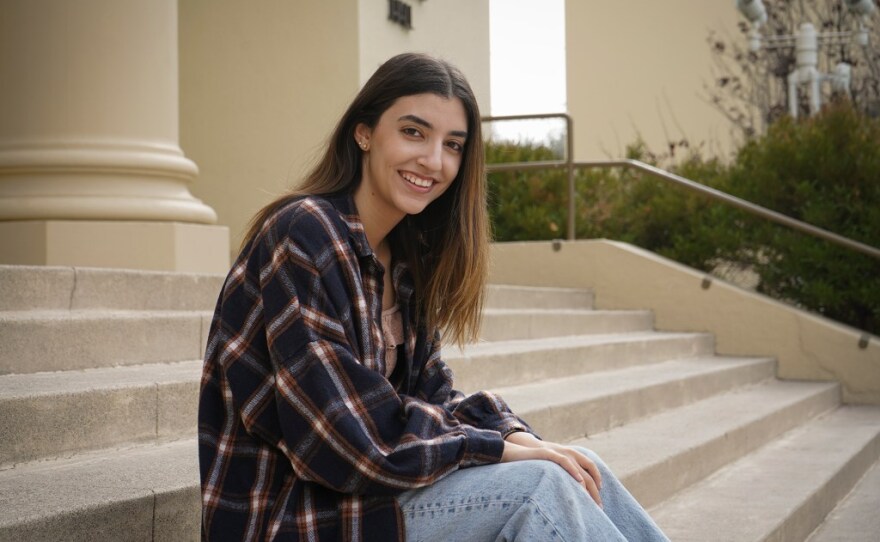
Tatiana Douaihy, Chapman University
Junior majoring in Strategic and Corporate Communication and English
I’m from Lebanon, and I started attending school in the U.S. two years ago
I’ve had to deal with a lot of COVID regulations, especially flying in and out of the country. My flights back home are sometimes 17 hours. I usually double mask because I don’t want to catch the virus while flying. I think I got tested like around 50 times last year. Also, I always quarantine when I go back home for at least five days. And then I get tested again.
As an international student, I felt like I was going through the worst-case scenario that any international student could go through — being so far away from home and being unable to see my parents during a global pandemic. It’s like an apocalypse. I remember when I first said, I wanted to move abroad, everyone was like “What if something happened and you’re unable to get back home?”, and I used to laugh at them, and I was like, “What’s going to happen?”
When big things happen in Lebanon, I see it on the news, and it sucks because it just makes me want to just go back home. Also when Facebook and WhatsApp crashed, I was unable to communicate with my family and that freaked me out because Lebanon is in such an unstable place that I was worried that I would not be able to communicate with them if anything happened. So that was an instance where it was hard for me to focus on my classes.
I always feel guilty that I get to continue in my life abroad when my friends and family back home have to deal with all the political crises and the issues in Lebanon. I’m privileged that I have the ability to do that and I recognize that every day. But it also feels like I’m turning my back on my country, even though I have no other choice.
— Interviewed by Juhi Doshi
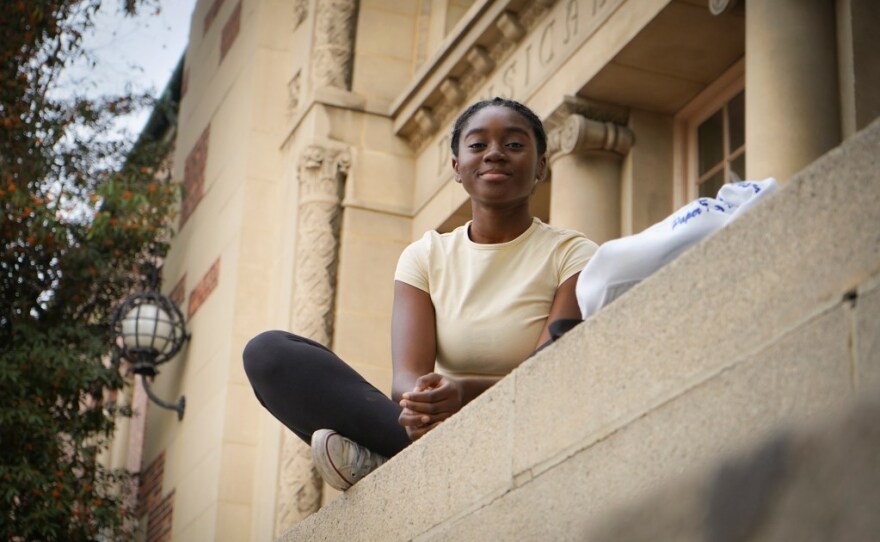
Nia Otchere-Sarfo, University of Southern California
Junior musical theater major
Being at home, everything is so convenient and I feel like classes were taken at a bit of a slower pace. I think being back on campus, it’s like you’re forced to get back in that groove. As a musical theater major, we have rehearsals, and we’re expected to be here and there and bam, bam, bam — it was really hard. Because your body has to get used to going from zero to 100.
I kind of got used to being in my solitude and then coming back into a social space, that was really difficult for me. Even getting together with my friends, holding a conversation, all that stuff, I had to really kind of teach myself. Now that I have been home, spending time with myself, I can say I know myself a lot better. And I know the kind of friends that I need and that I cherish.
There was a different kind of energy that you’re using in Zoom classes. Everything is in the voice and in the face when you’re acting. So oftentimes you have to feel like you may have to really push vocally or really make some kind of big expression physically because something really subtle may not be picked up. I was so looking forward to going back to the classroom. I thought it was going to be a bit of a struggle but I was very relieved. I was like, “Finally, I can use my body again, I can really be in my body and really be as expressive as I can be.”
— Interviewed by Steven Vargas
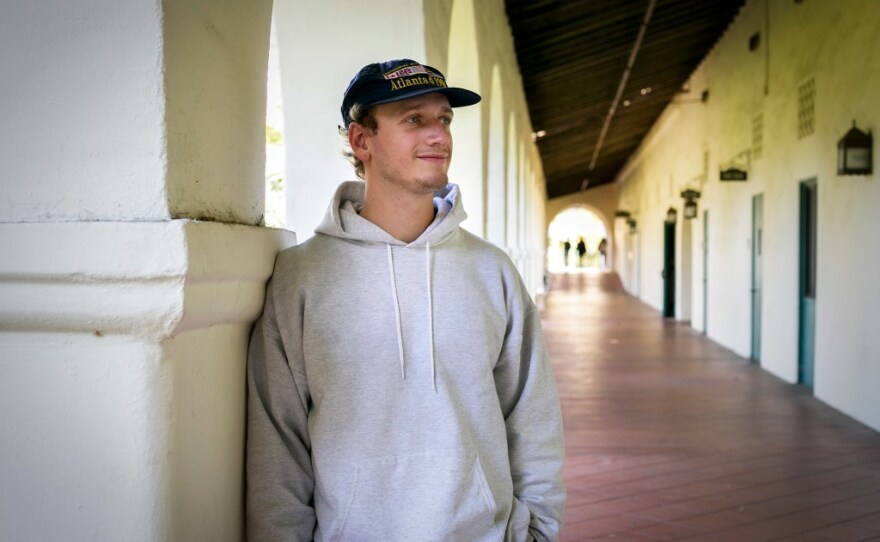
Ben Kasdorf, San Diego State University
Junior marketing major
It’s weird being a college student and living in a van. It’s like I’m camping. At first, I was really nervous and I would worry about the temperature, where I was going to park if it was safe, but I’ve adjusted. It’s tough sometimes. Car problems mean that I’m homeless if I have to take my van into the shop. I have to be really discreet, too. If I’m near students on campus, I climb up to the front so I don’t open the side doors and let everyone know that it’s kind of, like, set up. All it takes is one person to see, “Oh, this van has an entire life in it, an entire person’s possessions.”
During COVID, my dad’s business was struggling. He owns properties in Wisconsin and his income is rent from people, but people stopped paying their rent because a lot of people were getting laid off and a lot of people took advantage (of the eviction moratorium). Originally my dad was helping me pay my rent out here, but I didn’t want to put that burden on him or anyone in my family.
Had school not come back in person, I don’t think I would’ve come back. Why pay out-of-state tuition for online schooling? I don’t learn well from lectures. I have to talk to TAs or professors after class. I can be a C or B student going to big lectures, but I can’t be an A student unless I have my extra questions answered personally.
I wasn’t mad about the vaccine (mandate), because you have to get vaccinated for everything to go to college anyway, but the mask gets old when you’re in the gym doing cardio. I go to the gym every day because, um, I live in a van, so I have to shower at the gym. It’ll be annoying to wear a mask for eight or nine hours straight, but it keeps everyone safe, and somehow there hasn’t been an outbreak (on campus), so they must be doing something right.
— Interviewed by Emily Forschen
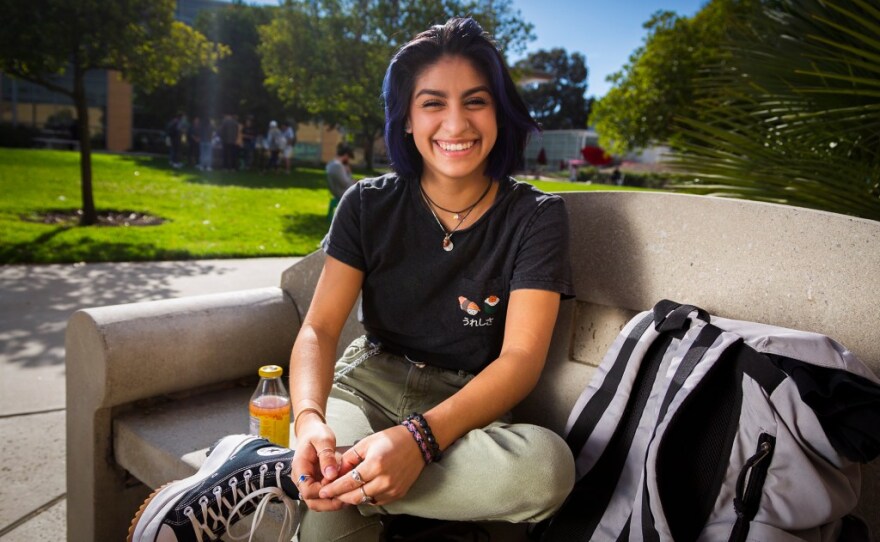
Analí Salazar, Cal Poly San Luis Obispo
Junior transfer student, studying mechanical engineering
I’m a transfer from Santa Barbara City College. Going from a school where we had an environment where it was all people of color, all coming from similar backgrounds to coming to a campus where everyone’s white, it’s definitely a transition, to say the least. I have a friend in my class who I know from City College, and he also speaks Spanish. We’ll be in our welding class, speaking in Spanish, and we’ll be yelling at each other in Spanish because that’s how we are, and everyone is staring at us, like, “What are they saying?”
It’s been funny in that circumstance, but it’s definitely different in the aspect of walking around campus and then seeing a huge group of frat boys walking towards me. I am a small person. I am a five-foot little brown girl. So seeing a huge group of, like, 6’3” white frat men — not a great feeling. That’s been the biggest difference, being in an environment where I don’t know if I’m ok. They could be the nicest people ever, but also, you have no idea, because of how many incidents so many frats have had.
— Interviewed by Stephanie Zappelli
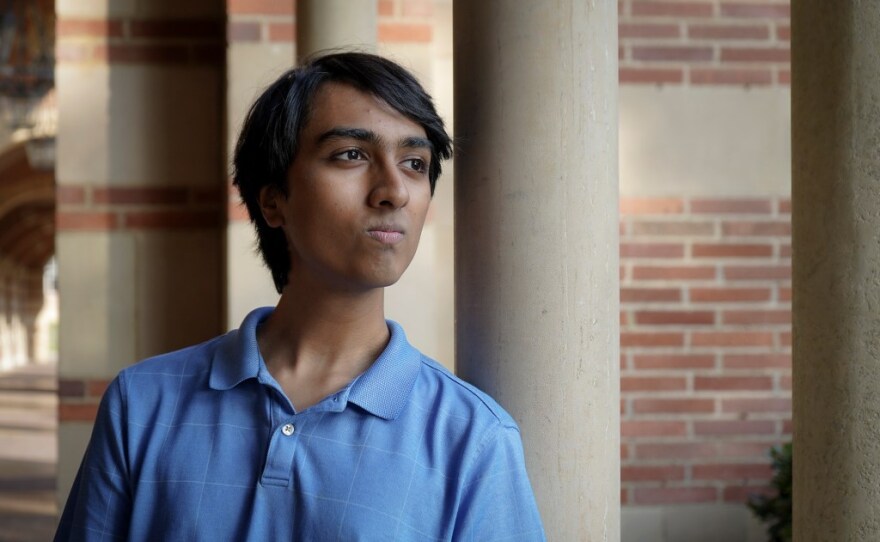
Sudarshan Seshadri, University of California Los Angeles
Sophomore electrical engineering major
I don’t know much about campus and obviously, things have changed a lot from before COVID. But I am enjoying it because I’m getting to meet a lot of people here and it’s nice having human interaction after a year of definitely not (having) that.
I love cats. And this one day, I saw a post on the UCLA subreddit. Something about Powell Cat (a beloved cat on campus) not letting you pet him. And I had just pet him the day before. So I posted a video (of myself petting the cat), and people seem to like that. And I made a joke saying, “I’m gonna do one of those things every day.” That was a joke, but I did it the next day and said, “Day one,” still mostly at that point a joke, but there were a lot of upvotes so I just did it again. And I kept doing it until I guess we’re at Day 43 now, which is pretty crazy.
I’ve gotten so much positive feedback. I remember there was this one guy who made a post, like, “Keep doing this, it’s like daily therapy,” and I’m like, if you put it like that, that’s wonderful. There’s so many people saying “Oh, yeah, you know, I am not on campus. I haven’t been able to meet Powell Cat. I’m living vicariously through you.” I love that. I’m glad a lot of people are getting a lot of positivity from my daily posts.
— Interviewed by Bernard Mendez
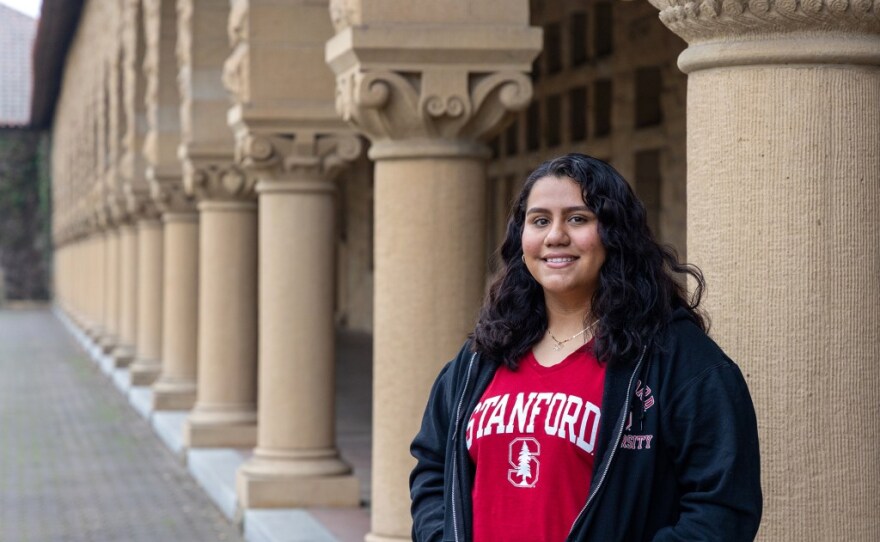
Airin Valdez, Stanford University
Freshman, major undecided
As a first-generation student, I did not feel adequately prepared for college-level work, especially at a school like Stanford.
My whole senior year (of high school) was online learning. It was very difficult to not only learn the material but have to teach myself the content since personally I’m more of a visual and tactile learner. Having to balance school work and home responsibilities also made my online experience challenging. I’m the oldest of three children. My brother was a freshman in high school so I had to help him a lot with homework and also my younger sister, who is in middle school. I also had to help around the house.
I am very happy to transition onto on-campus life since I have the opportunity to experience my first year of college in-person, but after a year of online learning, it’s very difficult and so different. I often feel behind compared to my peers who have more resources or had the opportunity to be exposed to content that is completely new to me.
A way the university has helped with this transition has been having programs in place for students that are first-generation and low-income, like me. I was able to come onto campus early during the summer and take a math and English class to develop my skills. But their support is very continuous, not just during the summer but also now during the school year — like being able to speak with an academic advisor who specifically works with first-generation and low-income students.
— Interviewed by Itzel Luna
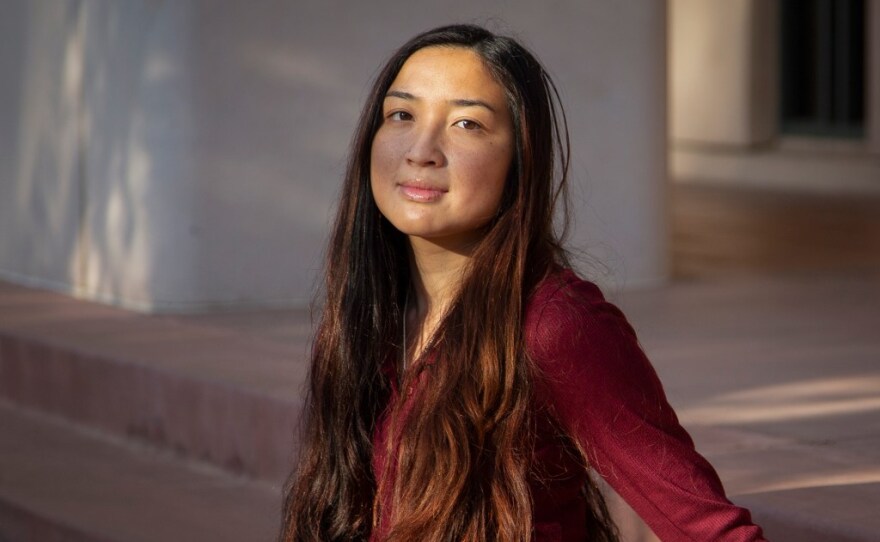
Raichel Tjan, Cal Poly San Luis Obispo
Junior transfer student studying business
Women are targeted, and especially with what’s going on recently with the attacks on Asians, I was really scared of that coming to school. First of all, I’m a girl. Second of all, I’m an Asian girl in a non-Asian dominant city, which I’ve never lived in before. So it was, like, scary coming to school in general. It’s been fine, but I’ve definitely noticed myself looking around and looking for people of color.
I honestly just don’t feel safe in general anytime I’m walking in the dark by myself. I like to wear my air pods when I walk around, but at nighttime, I make sure they’re out. I make sure I have my keys and pepper spray — everything ready. I have my phone ready to call someone. But luckily that night, a guy who was also in (Week of Welcome), he walked up to me and was like, “Hey, you shouldn’t be walking alone. You know, like, we both shouldn’t be walking alone in general. So maybe we should walk together.” We’re still friends now.
It’s safety over everything to me especially because that’s what my mom stresses so much because she’s had an experience of almost being attacked when she was in college. It’s such a big thing to her, and I don’t want her to worry about me.
— Interviewed by Stephanie Zappelli
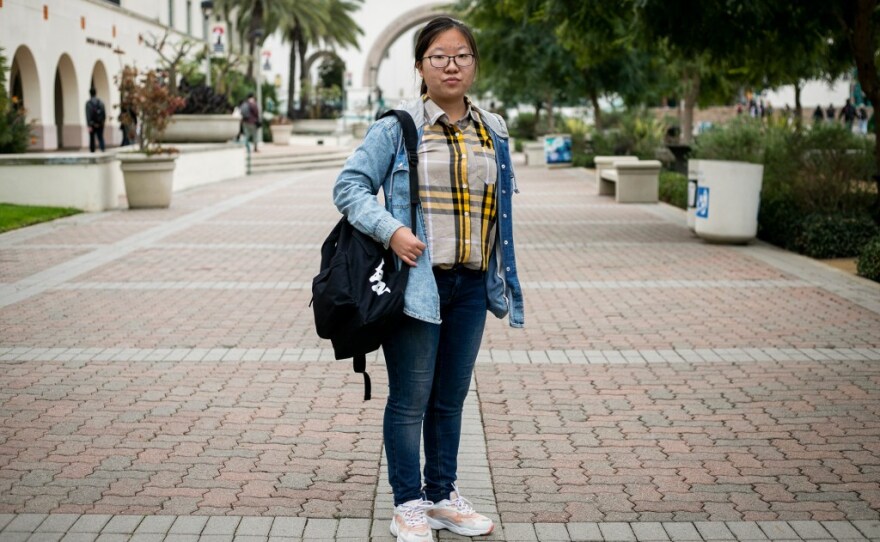
Sarah Hong, San Diego State University
Freshman economics major
A lot of the international students, most of them, say they have lived in America for four years and they have no friends. I thought, maybe I will be like the rest of them, but it seems like not. I’ve made lots of good friends and I’m very gratitude. Gratitude? No. Grateful.
When I was in middle school, I had a really severe depression. It was because of the stress of studying. It was the darkest time of my life and I didn’t want to experience it again in high school. So I thought I would go to America to experience another kind of lifestyle. I didn’t have a very happy life in China, so I wanted to go to a brand new environment.
The pandemic is so different in China. If there are even two cases in the city, they close the whole city. They will prohibit people getting out and taking public transportation to other cities, and when you are out, you must wear a mask. Here, it’s like there is no pandemic. Nobody cares about it! I receive the COVID-19 digest with all the cases on campus and nobody cares about it. No one wears a mask at all. I’m a little mad about it, but it is their freedom. It’s just like, they should protect themselves. Maybe I am just used to wearing a mask.
I think online school is meaningless. I wanted to go to America to speak English like a native speaker. Oh, it’s just a dream! I want to learn something really useful for me, not just keep my GPA a high score, but to use my hard work. Online school makes me feel like I am not learning what I need to learn.
— Interviewed by Emily Forschen
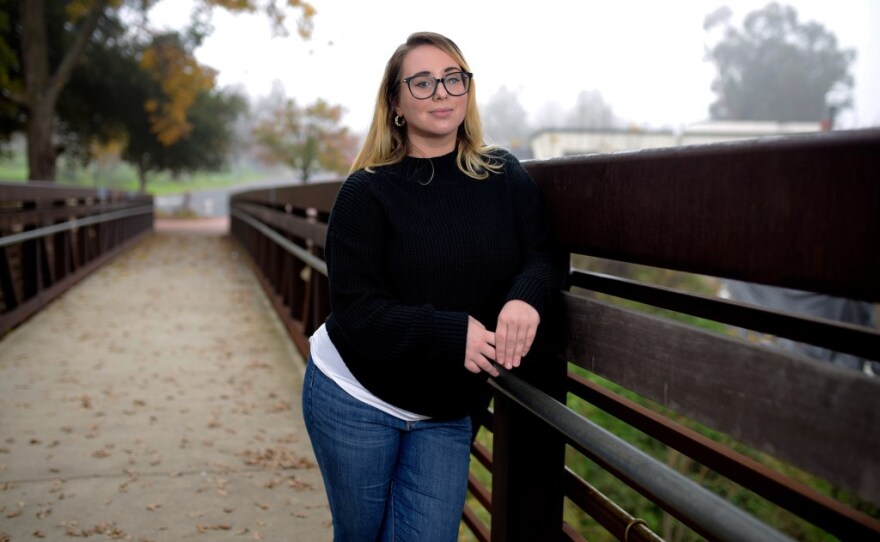
Ashley Hayes-Stone, San Francisco State University
Junior journalism major
When I originally applied to San Francisco State at the beginning of the pandemic, I wanted to live in the city. I wanted that lifestyle, but it’s really expensive and I didn’t know how I was going to do it. When the pandemic hit, it was almost relieving in a way, because (finding a place to live) was one less thing I had to stress about.
Because I live in Vacaville and I work in Sacramento, I thought, “This is perfect.” I can go to school online and get my degree and be done. It was stressful at first, but once I got a hang of it, I found it useful to be able to go back and review the lectures more than once, and take really good notes, and I have actually been getting really good grades.
However, they are making classes that I need in-person for next semester. It’s really difficult to go to Sacramento, then go to the city, and then go home. I know that everyone wants to go back to normal, but I find it really difficult to go back to that life, especially in a time that’s really uncertain.
To ask students to attend on-campus classes who have already grown accustomed to learning online is unfair. They should be given the opportunity to at least finish it online. I feel that the schools are putting their needs before the students, even though we are the ones that pay for everything.
I understand we have to get back to some normalcy, but for people like me who have been doing this for a while, we just want to move on.
— Interviewed by Oden Taylor
Doshi, Forschen, Luna, Mendez, Taylor, Vargas and Zappelli are fellows with the CalMatters College Journalism Network, a collaboration between CalMatters and student journalists from across California. This story and other higher education coverage are supported by the College Futures Foundation.





